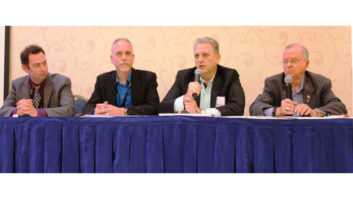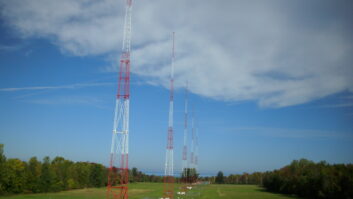The FCC is looking into what happened to communication systems in the Northeast, mid-Atlantic and central states during and after the recent “Derecho” storm in early July. It’s now asking for public input on damage to communication systems in the wake of the storm.
The timing, though unrelated, comes on the eve of a meeting at the FCC between broadcast and wireless industry representatives to discuss the issue of activating and embedding FM chips in cellphones and mobile devices. Broadcasters have been citing safety issues as one reason for the wireless industry to voluntarily include radio receiver chips in devices.
The storm, with little notice, brought hurricane-force winds in some areas, downing trees and power lines as well as affecting phone communication. Millions of people lost electrical power for periods ranging from a few hours to over a week in the middle of a heat wave.
The commission notes the storm had a significant adverse affect on communications services generally and 9-1-1 facilities particularly. “From isolated breakdowns in Ohio, Kentucky, Indiana, and Pennsylvania, to systemic failures in northern Virginia and West Virginia, it appears that a significant number of 9-1-1 systems and services were partially or completely down for several days,” sates the agency in its notice.
It appears multiple access technologies were affected, including traditional phone networks, broadband networks and wireless networks, according to the commission, which says its Public Safety & Homeland Security Bureau coordinated with FEMA to grant special emergency authorization to power crews to use certain frequencies for service restoration in several areas.
The commission’s Operations Center obtained information on communications outages related to 9-1-1 centers, broadcast stations and public safety communications systems that it shared with FEMA. Information on outages also came through the commission’s mandatory Network Outage Reporting System and voluntary Disaster Information Reporting System.
Information related to the storm is still coming in and the agency is assessing that, however the FCC wants to expand its review by broadening who can contribute information, and focusing directly on the “Derecho” storm as well as information on the resiliency and reliability of communications after other natural disasters. Derecho is a term referring to unusually high-speed winds, up to hurricane force.
In a Notice of Inquiry released this April regarding the resiliency and reliability of the nation’s communications infrastructure, including broadband technologies, the FCC also focused on 9-1-1-, saying: “[p]eople dialing 9-1-1, whether using legacy or broadband-based networks, must be able to reach emergency personnel for assistance; and when networks dedicated to public safety become unavailable, first responders must have access to commercial communications, including broadband technologies, to coordinate their rescue and recovery efforts.”
Comments to PS Docket 11-60 are due Aug. 17.










